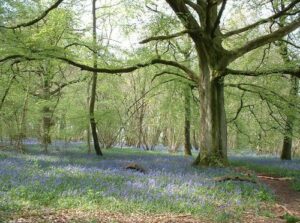The ForeSight project will anticipate how forests will be adversely impacted as the climate warms and becomes more extreme, hampering tree growth, and causing dieback and mortality.
Professor Alistair Jump, of the Faculty of Natural Sciences at Stirling, will lead the study, funded by the Natural Environment Research Council (NERC) and involving colleagues at Forest Research, Durham University, the Technische Universität Dresden and the Technical University of Munich. Forest Research’s role is to integrate their web-based Ecological Site Classification decision support system into the work.
“More intense drought and increased temperatures reduce tree growth and drive tree dieback and mortality across the globe,” explained Professor Jump. “While this problem has been recognised for some time, the processes and geographical extent of forest growth reduction and die-off are not well understood.
“Predicting the response of Europe’s forests to drought and temperature change is a key challenge because forests have enormous economic and ecological benefits that will be impacted as climate warms and becomes more extreme.
“This new funding will allow us to adopt an interdisciplinary approach to address these issues by predicting and monitoring drought-linked forest growth decline across the continent.”
This work will contribute to major new scientific insights into forest growth reduction and die-off in response to drought, with substantial benefits for improving our understanding of impacts on our ecosystems and atmosphere.

The new project will focus on European beech – the most widespread broadleaf tree in Europe, covering more than 15 million hectares. Beech produces valuable wood and fibre, which is used diversely and is known to be at high risk from drought-linked dieback and mortality.
The research will link satellite observations and process-based models calibrated from a data network that provides a detailed picture of tree growth from about 10,000 trees across 25 countries. The data will enable the team to model the processes and extent of tree growth suppression and to map and monitor drought-stress vulnerability across the entire range of beech in near real-time. New tools developed in the project will support forward planning for UK forest management.
Professor Jump added: “This work will contribute major new scientific insights into forest growth reduction and die-off in response to drought, with substantial benefits for improving our understanding of impacts on our ecosystems and atmosphere.”
Planting woodland adjacent to established woodland or in large clumps is more likely to boost bird populations than random planting, modelling suggests.

Forest Research has announced that Dr Bianca Ambrose-Oji, currently Head of its Society and Environment Research Group, will succeed Professor Chris Quine FRSE as Chief Scientist from June 2025.
England’s non-woodland trees have been mapped for the first time, revealing these trees make up nearly one third of our nation’s tree cover.
Planting woodland adjacent to established woodland or in large clumps is more likely to boost bird populations than random planting, modelling suggests.

Forest Research has announced that Dr Bianca Ambrose-Oji, currently Head of its Society and Environment Research Group, will succeed Professor Chris Quine FRSE as Chief Scientist from June 2025.
England’s non-woodland trees have been mapped for the first time, revealing these trees make up nearly one third of our nation’s tree cover.